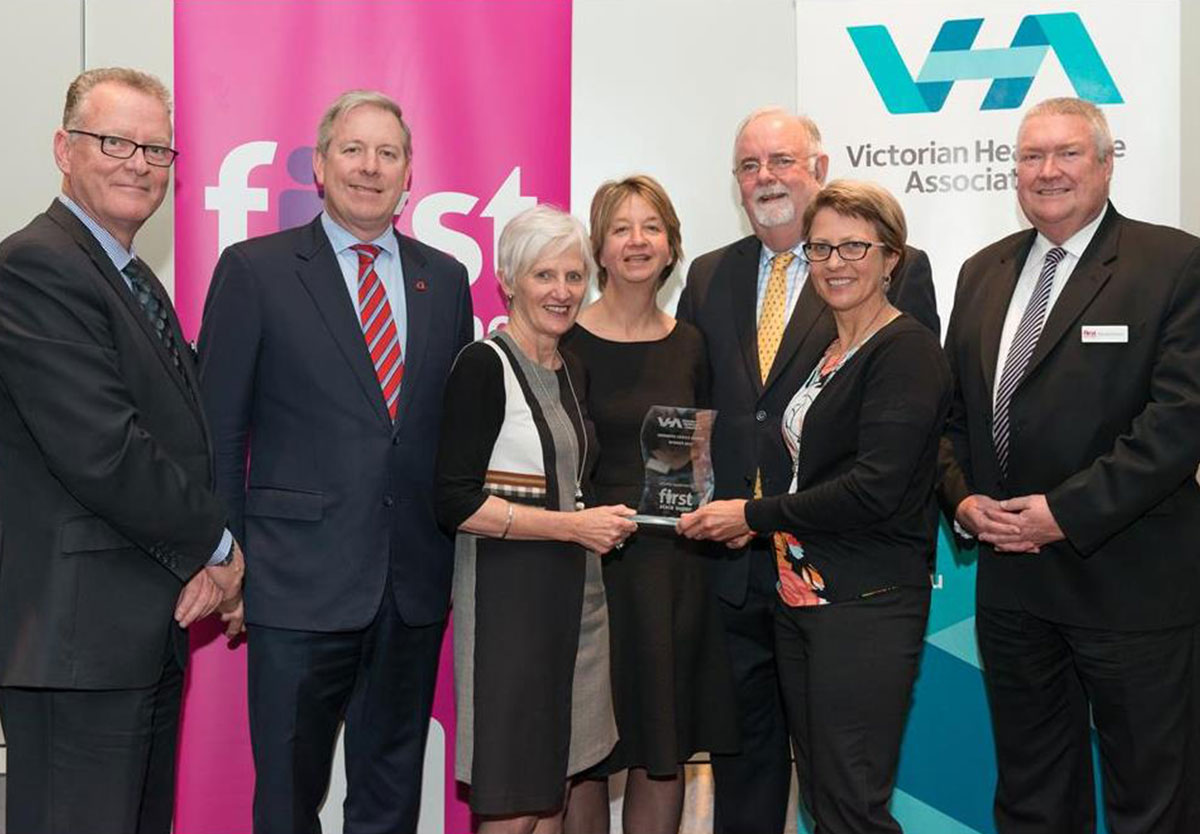About Rural Northwest Health
CARG Award
August 3, 2015

Rural Northwest Health’s Community Action Research Group has won a prestigious state award from the Victorian Health Association.
Warracknabeal pharmacist and CARG leader John Aitken and CARG founder Professor Jane Farmer from La Trobe University accepted the award from Victorian Minister for Health David Davies during a ceremony at Melbourne’s Hilton on the Park. CARG governance committee member Wendy Hewitt and RNH board member Janette McCabe also attended the event.
The award is the VHA Health Services Members Award for the Improving Community Health through Participation and it was one of two presented on the evening. There were five finalists for the award and each made a brief presentation to a packed room of VHA conference delegates.
Mr Aitken spoke on behalf of the research group during the on-stage discussion which was hosted by ABC Radio National host Dr Norman Swann. The Community Action Research Group was formed as a community-driven project to improve the health and wellbeing of Hopetoun, Beulah, Brim, and Warracknabeal residents.
In March 2013, RNH partnered with Professor Farmer who was head of La Trobe Rural Health School. They appointed Warracknabeal pharmacist John Aitken to head the group as a study for a PhD. Under the school’s supervision Mr Aitken convened a series of public meetings to discuss the community’s health and wellbeing.
The information has been recorded and documented so the data can be used to help establish the most likely future health needs for the region.
Mr Aitken said after the awards dinner that it was great recognition for the RNH region.
“It’s a great honour because we have been chosen by our peers in the health industry, those being the delegates at the conference,” Mr Aitken said.
“We’re getting external recognition and that reflects well on RNH and the three campuses,” he said.
Mr Aitken said RNH was at the forefront of the consumer engagement process and that’s where healthcare wants to go.
“The better relationship you have with your community, the better the health outcomes that can be achieved,” he said.
Mr Aitken was part of an RNH delegation that presented results from the CARG studies at the Leading Age conference in Nashville in October, 2014. The event was America’s largest aged care conference.
The delegation also included RNH chairman Leo Casey, CEO Catherine Morley and La Trobe University’s Kaye Knight.
Professor Farmer, who is associate pro vice-chancellor for Research at La Trobe, is an internationally acclaimed rural health researcher. She said the aim of the CARG project was to get local people involved in identifying their health and wellbeing priorities, using evidence and uniting community members with its local health services provider to devise key actions residents and services could progress.
“Speaking with around 650 people from all different backgrounds, in workshops, ‘chat’ sessions and visual mapping of issues and ideas, it was clear that mental wellbeing, intergenerational health and better access to services for older people were biggest community concerns,” Professor Farmer said.
“With RNH staff and La Trobe Rural Health School researchers all part of the conversation, cost-effective solutions and direct action quickly occurred,” she said.
“Importantly, this involved local people leading initiatives. This is about local people linking with those running their health system.
“Benefits have included greater health literacy for local people, stronger relationships and understanding between healthcare staff and ‘the community’ and a much more seamless relationship between the service and citizens, rather than ‘them and us’.”
Professor Farmer said the project had already seen major mental health and aged care forums held, the introduction of community gardens supporting intergenerational socialisation and plans to forage friendly gym equipment set up in community spaces to promote exercise for older people and those with a disability.
“These community priorities are now part of RNH strategic management planning and will be on-going,” she said.
“This project shows how effective the combination of community working with researchers and health providers can be.
“The concrete outcomes that have flowed on for residents are low cost , improved participation and knowledge in community health and wellbeing and moving beyond a traditional approach to healthcare, to one where the community drives and gets completely involved in, determining their health future.
“Properly engaging the community like this, is something we would like to see rolled out across the country.”


